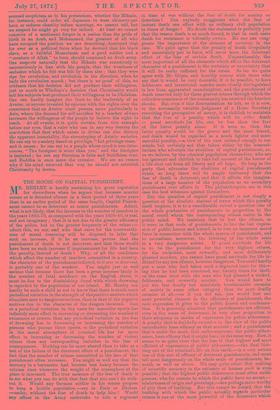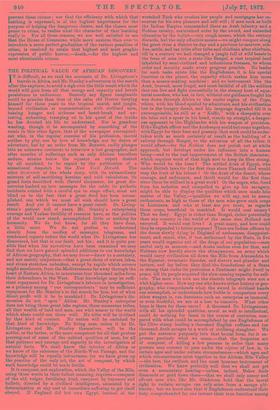THE HOUSE ON CAPITAL PUNISHMENT.
MR. HENLEY is hardly sustaining his great reputation for shrewdness when he argues that because murder occurs or is detected oftener in a later period of three years than in an earlier period of the same length, Capital Punish- ment cannot be so deterrent as minor punishments. Admit, what is not likely, that the increase in the number of murders in the years 1866-70, as compared with the years 1836-40, is real, and not imaginary ; that it is not due to the greater efficiency of the police, but to the greater frequency of the crime ;- admit this, we say, and who that cares for the trustworthi- ness of moral reasoning will be disposed to infer that such an increase, if it be an increase, proves that the punishment of death is not deterrent, and that there would have been no such increase if imprisonment for life had been the penalty, instead of death ? Why, of all the conditions which affect the number of murders committed in a country, the character of the punishment inflicted, be it ever so deterrent, is probably one of the weakest. You might just as well assume that because there has been a great increase lately in the number of fatal accidents on the English rivers, it must be due to the diminishing dread with which drowning is regarded by the population of our island. Mr. Henley can hardly be such a child as not to know that there is much more periodical variation in the strength of the positive motives which stimulate men to dangerous actions, than in that of the negative motives due to the character of the dangers incurred. Just as a periodical variation in the taste for muscular sports has infinitely more effect in increasing or decreasing the number of swimmers or rowers, than any periodical variation in the fear of drowning has in decreasing or increasing the number of persona who pursue these sports, so the periodical variation in the moral atmosphere of criminal life has far more effect in increasing or decreasing the number of violent crimes than any corresponding variation in the fear of consequences. Nothing can be more absurd than to take as a test of the failure of the deterrent effect of a punishment, the fact that the number of crimes committed in the face of that punishment often increases. You might as well say that the mercury in a barometer had become less heavy because the colamn rises whenever the weight of the atmosphere at the place is increased. The true measure of the fear of death is to see what you can do with that fear that you can't do with- out it. Would any German soldier in his senses propose to keep a hostile population,—say in Paris or Rheims, —under, without the fear of death to help him ? Would any officer in the Army undertake to rule a regiment in time of war without the fear of death for mutiny or idesertion ? Can anybody exaggerate what the fear of instant death can effect with an ordinary civil population in times of danger ? No doubt the statement is perfectly just that the reason death is so much feared, is that in such cases death for resistance is tolerably certain. No one can exag- gerate the importance of the element of certainty in the case. We quite agree that the penalty of death irregularly and uncertainly put in force, will never have the deterrent effect of the fear of certain death. Unquestionably, the most important of all the elements which affect the deterrent character of a punishment is the certainty or uncertainty that it will be really inflicted for the crime. So far we quite agree with Mr. Gilpin, and heartily concur with those who say that it would be very desirable, if it be possible, to have deliberate and intentional murder more clearly distinguished in law from aggravated manslaughter, and the punishment of death reserved only for those gravest crimes through which the collective conscience of the community has received the heaviest shocks. But even if this discrimination be left, as it is now,. to the necessarily variable judgment of a Homo Secretary exercising the prerogative of mercy, it is childish to maintain that the fear of a penalty which will be either death or penal servitude for life, can be leas than the fear of the latter penalty alone. If it were so, then the latter penalty would be the graver and the most feared, and death would be regarded as a much lighter and more merciful penalty,---a view of the case rational enough to our minds, but certainly not that taken either by the humani- tarians who advocate the abolition of capital punishment, or, as we believe, by the criminal population themselves, who are too ignorant and childish to take full account of the horror of a life shut out from all liberty and all hope. So long as the party that advocates the abolition of capital punishment exists, so long there will be ample testimony that the fear of death is deterrent, and that it affects the imagina- tions of a large number of the population as no secondary punishment ever affects it. The philanthropists are in this case the best witnesses against themselves.
But the question of capital punishment is not simply a question of the absolute amount of terror which this penalty itself inspires, it is to a considerable extent a question also of the whole graduation of punishments in proportion to the moral recoil which the corresponding crimes excite in the public mind. We maintain that to lose the climax, as it were, in that scale of punishments, to lose the last expres- sion of public horror and hatred, is to lose an immense moral force in connection with the whole system of punishment, and to necessitate, moreover, the lowering of the whole scale to a very dangerous extent. If penal servitude for life is to be the punishment for the very highest crimes, for the wickedest, most cowardly, and most deliberately planned murders, you cannot have penal servitude for life in- flicted for any less offence, however dangerous. You could hardly put a man who had taken such a depraved taste for thiev- ing that he had been convicted, say, twenty times for theft, on the same level with the man who had planned a wicked, deliberate, and cowardly murder. You would have to put the less deadly but absolutely irreclaimable enemies of society in some other category than its most deadly enemies of all,—or if you did not, you would lose one most powerful element in the efficiency of punishment, the rude expression it gives to the public horror and condemna- tion. It is generally admitted that punishments are efficient, even in the sense of deterrence, in very close proportion to their adequacy as modes of expression for public abhorrence. A penalty that is decidedly excessive in the view of the public immediately loses efficacy on that account ; and a punishment that is under the mark, that under-expresses the public abhor- rence, loses efficacy that it might have, in the same way. Now, it seems to us quite clear that the loss of that highest anti most efficient of expressions of public abhorrence,—the final blot- ting out of the criminal's life on this earth,—is a very serious loss of this sort of efficacy of deterrent punishments, and must tell most dangerously on the whole scale of punishments, be- neath as well as above. We may quite admit that nothing of scientific accuracy in the estimate of lamina guilt is even possible ; that the highest public abhorrence thirst often strike persons, who for reasons to which the public have. no access,— misfortunes, of origin and parentage,---are perhaps more worthy of pity than of loathing. But this cannot be denied, that the loathing with which the public actually regards particular crimes is one of the most .powerful of the deterrents which prevent these crimes ; nor that the efficiency with which that loathing is expressed, is of the highest importance for the purpose of helping the dangerous classes, and the classes most prone to crime, to realise what the character of that loathing really is. For all these reasons, we are well satisfied to see that the House of Commons, while more anxious than ever to introduce a more perfect graduation of the various penalties of crime, is resolved to retain that highest and most graphic expression of public horror,—death,—for the highest and most abominable crimes.



































 Previous page
Previous page